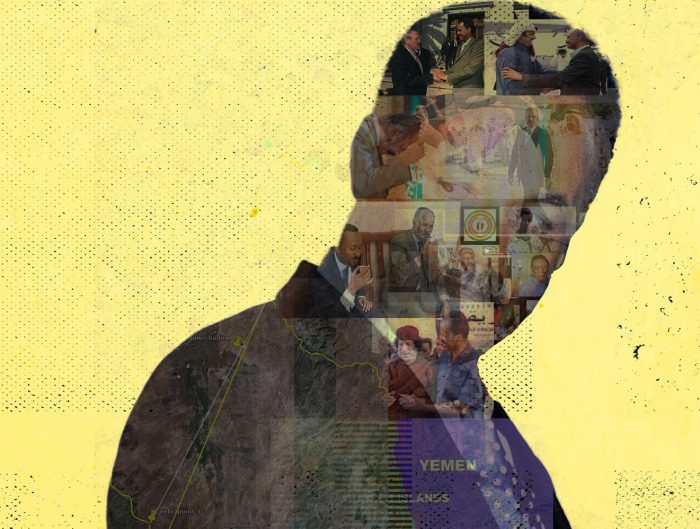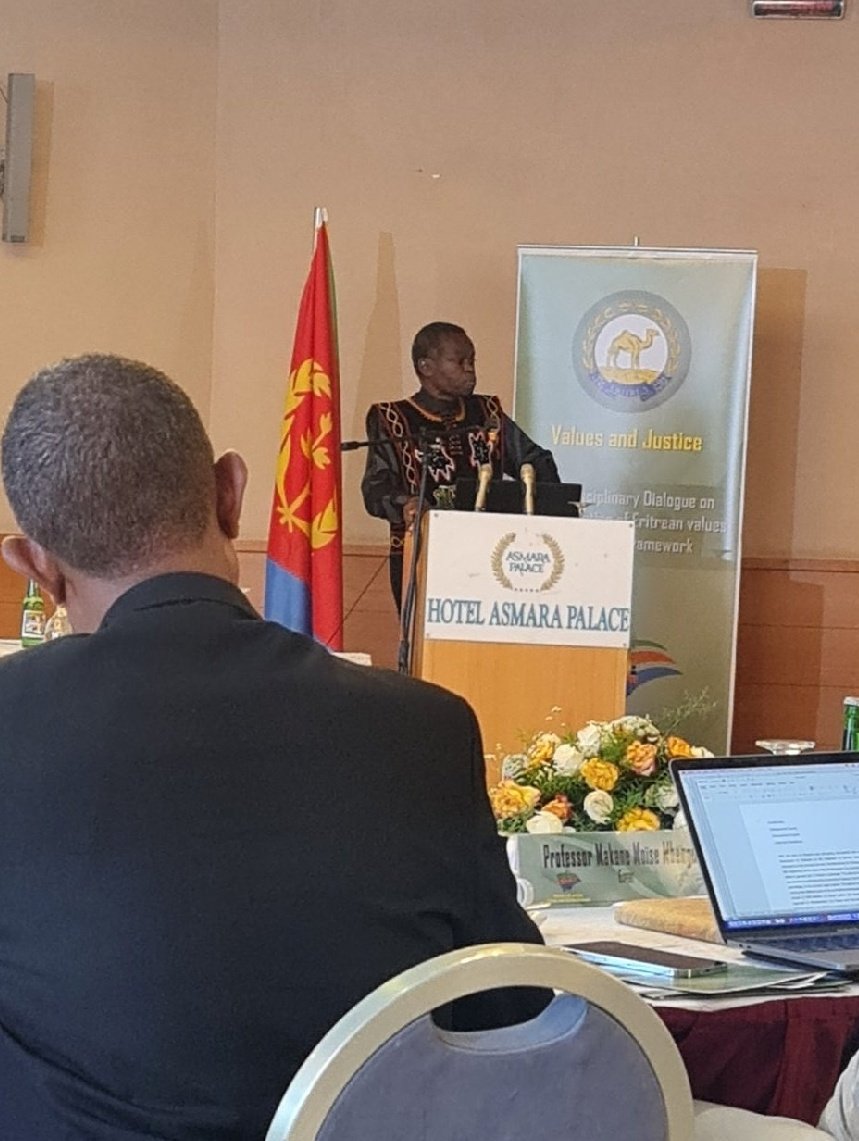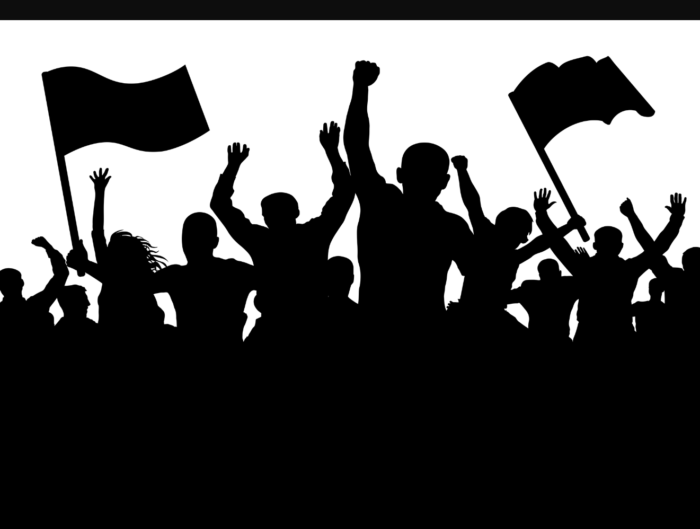Last year, the Isaias Government brought the US to its knees by telling the world that Ethiopia’s Prime Minister Abiy Ahmed is the leader of Eritrea and, thus, Eritrea is a defacto province of Ethiopia, and thus to punish Eritrea is to punish Ethiopia. This forced the US to lift the UNfair and UNjust and UNlegal (is that a word?) sanctions. And now, the same UN that had sanctioned Eritrea and was going to haul the President of the State of Eritrea, kbur presidente Isaias Afwerki (and his assortment of thieves, arms traders, human smugglers, contrabandists, drug dealers) to ICC, has yielded and said Eritrea (under PFDJ) is doing a fine job safeguarding its unity, respecting women and children, and developing. This just proves to any doubter that the good Lord is on the side of Isaias Afwerki. Actually, there is no proof that the Good Lord is not Isaias Afwerki. Praise the Lord and bank at the Commercial Bank of Eritrea.
Meanwhile, the propagandists at Eritrea’s State media Shabait.com could not leave well enough alone and they asked one of the well-meaning Africans, Vera Songwe, who is the Executive Secretary for the UN Economic Commission for Africa (UNECA): hey, what’s up: could you tell us about this fine conference we are having at Asmara Palace?
This is how it went:
What is the objective of the workshop?
“The objective of the workshop is to popularize Agenda 2040, Africa’s agenda for children, and also to share with member states from the North and the Horn of Africa the findings of studies carried out throughout the continent regarding children on the move. Our mission is to create an Africa that is fit for children by monitoring and implanting the charter and holding state parties to account for the implementation of Child treaty.”
This takes us to the African Union’s Agenda 2040 and how it is monitored in every country. Agenda 2040 was adopted by the Africa Committee of Experts on the Rights and Welfare of the Child (ACERWC) at the 28th Ordinary Session in Banjul, The Gambia (The headquarters of African Commission on Human & People’s Rights.) Here is a 7-minute briefer for those of you who don’t like to read (why are you here, anyway?):
Here are the 10 “aspirations” that the ACERWC is hoping will be implemented continent-wide by the year 2040:
Aspiration 1: The African Children’s Charter, as supervised by the African Children’s Committee, provides an effective continental framework for advancing children’s rights.
Aspiration 2: An effective child-friendly national legislative, policy and institutional framework is in place in all Member States.
Aspiration 3: Every child’s birth and other vital statistics are registered.
Aspiration 4: Every child survives and has a healthy childhood.
Aspiration 5: Every child grows up well-nourished and with access to the basic necessities of life.
Aspiration 6: Every child benefits fully from quality education.
Aspiration 7: Every child is protected against violence, exploitation, neglect and abuse.
Aspiration 8: Children benefit from a child-sensitive criminal justice system.
Aspiration 9: Every child is free from the impact of armed conflicts and other disasters or emergency situations.
Aspiration 10: African children’s views matter.
Now, for those of you who didn’t watch the 7-minute video above, at the 4:18 minute mark, an excellent answer is given to the question of how/why will governments actually do this? The speakers say as long as Civil Society doesn’t give a push, the Agenda will remain on paper; and the Media also has a responsibility to play (to hold the State accountable.)
Eritrea’s Dilemma
Ask a supporter of the Isaias Afwerki regime and he will tell you: sure we have Civil Society. They are the National Union of Eritrean Women (NUEW); National Union of Eritrean Youth & Students (NUEYS); National Confederation of Eritrean Workers (NCEW); National Association of War Disabled Veterans (NAEWDV), etc.
Those of us opposed to the Isaias Administration say that all these groups are actually arms of the ruling party who owe their allegiance not to the constituencies they serve but the man who sits on top of the organizational chart: Isaias Afwerki. They serve at his pleasure and people elected by their constituents (for example NUEYS chair) will be removed and replaced by an Isaias Afwerki loyalist. In the entire time (decades now) that Eritrean girls were facing extreme hardship in the predatory culture of the male-dominated hierarchy of the Eritrean armed forces, NUEW had nothing to say and when its constituents, girls and women, wrote testimonies of their abuse to the UN’s Human Rights Council, it (under the direct orders of its male bosses) conducted a campaign to defame them as liars. The NCEW has never once held collective bargaining with the largest employer (the government) or protested the serf-status of Eritrean workers whose labor is exploited by regime officials whose only authority is that they wear a uniform and have insignia of authority on their lapels.
As for the role of the media, after the Eritrean government “temporarily” suspended the private press in 2001 (temporary = 18 years), the only journalists in the country are those who draw their check from the government. In one of his marathon interviews, dismissing the fate of Eritreans he has arrested for receiving money from NGOs and GOs, President Isaias Afwerki once said the act of being dependent on someone for money requires you to bend (to receive the money.) This then creates an unequal relationship of master and servant. That is not necessarily how the world works; what is important is that that is how he views the world. And this is clear not only in the body of work of Eritrea’s State Media (deferential to the government; highlighting nothing but its achievements), but their body language, which is that of an obedient serf. Very understandable in a country famous for disappearing journalists for the slightest infractions.
While we need to improve a great deal, the single contribution of the exiled Eritrean opposition has been in civil society and media. Unlike most of the UN and AU agencies (UNICEF, WHO, UNESCO, IFAD etc), the Africa Commission on Peoples & Human Rights, The Right of the Child etc actually solicit the views of Eritrea’s civil society when reviewing the self-generated report of a country. So, for example, when Vera Songwe was asked by Eritrea’s State media, “how do you evaluate member states’ approach towards the implantation of the agenda?” and she replied:
“Our evaluation system is based on the report we receive from party states, that is our most critical indicator of how well countries are doing”, she forgot to state that these reports received from States are compared with reports from Civil Society. The exiled Civil Society. All of which will only be reported by the exiled media.
Eritrea gave its self-report in 2015. I am embarrassed to say I never saw it (unless they are referencing the one that was submitted to the African Commission on People’s and Human Rights, which we reported on here.) So, in that report, do you think:
Eritrea reported that an “effective child-friendly national legislative, policy and institutional framework is in place”? You betcha. But, since 2003, Eritreans have been bussed to Sawa to finish their 12th grade and that, mathematically, many of them are 16 and 17 years old when bussed (i.e. children) and that this high school in Sawa is run jointly by the Ministry of Education (for academics) and Ministry of Defense (for the mandatory military training) and that, depending on logistical issues, the military training may precede the academic training or be run concurrent with it when many of the youth are 16 and 17 years old, ie. CHILDREN?
How healthy is the Eritrean child? How well-nourished? According to a recent report published by UNICEF (relying on data provided by the government, of course), the Eritrean child receives more immunization shots than his peers in Sub-Saharan Africa, but is significantly more underweight (65% vs 52%), suffers from more stunting (52% vs 33%) and wasting (15% vs 8%.) The long-term impacts of stunting and wasting into adulthood are quite severe. We are not even mentioning the emotional, mental health and spiritual health of the Eritrean child which has been traumatized by the Bully State and is in a very fragile state.
How is the quality of education? This is the one area that supporters of the Isaias Administration brag about the most when it should be the one they are most embarrassed by. With its fetish for militarization, the government has wasted the opportunities of a generation of Eritreans, particularly girls (Consequently, Eritrea’s child marriage rate is higher than sub-Saharan Africa.) Here are the numbers, again from UNICEF State of the World’s Children 2019, comparing Eritrean students, with sub-Saharan Africa students:
| Out of school rates | Eritrea | Sub Saharan Africa |
| Primary education, male | 61% | 19% |
| Primary education, female | 64% | 24% |
| Lower secondary education, male | 53% | 34% |
| Lower secondary education, female | 60% | 37% |
| Upper secondary education, male | 66% | 54% |
| Upper secondary education, female | 71% | 61% |
In any normal country, this would result in wholesale resignation of the government, beginning with its Head of Government. But in a country where there is no accountability, we are told the Minister of Education is also Eritrea’s Ambassador to Ethiopia. Priorities, priorities.
Moving on: is every child protected against violence, exploitation, neglect and abuse? Oh my God, no! The child is protected until such time as guardianship changes from parent to State (at the age of 16, 17). After that, the child ceases to be a child but a child-soldier civil-servant subject to military discipline which, in Eritrea, is particularly harsh. If there is one thing the Eritrean government has innovated, it is how to create new ways to punish citizens, including children: helicopter, OTTO, Ferro, Jesus Christ, Goma, mock drowning, beating on soles, etc. When some Eritreans (the gene-counters) accuse the Eritrean government of being an alien entity, it is primarily due to the level of cruelty it condones: the theory being no organic organization staffed by genuine Eritreans would sanction this kind of cruelty to its own people. How cruel? Eritreans in exile would rather commit suicide than be forcibly returned to Eritrea.
Do children benefit from a child-sensitive criminal justice system? Not even close. They are subjected to the same cruelty adults are. Often, children are imprisoned with adults. Sometimes, babies are imprisoned with their parents. Children have no family visitation rights in prison and the psychological impact is severe on the children and their families.
Are Eritrean children free from the impact of armed conflicts and other disasters or emergency situations? Not at all. Eritrea has been an independent state for all of 28 years and it spent all but 7 of those years dealing with wars and their disasters (displacement, orphanage, exile.) Despite the reports of the Eritrea-Ethiopia Claims Commission (EECC), and despite the Algiers Agreement calling on an African Union body to look into the origins of the Eritrea-Ethiopia conflict (ignored by both countries), the governments of each country have now been given free rein to tell their own narratives of who or what was responsible for the war. The Eritrean Government has decided that it was the fault of the United States (which, apparently, was also responsible for the Hanish Crisis, according to President Isaias Afwerki.) With no accountability for their roles in destroying the lives of tens of thousands of their citizens, enjoying total immunity, both governments are now pursuing the same policies that led to the original conflict to begin with: vagueness on trade and monetary policy, and indefinite suspension of border demarcation.
Thus, the Eritrean Child continues to be in dire straits: continues to constitute a large component of a large exiled population that, even now, in times of peace, is on the move, headed to anywhere, away from the land that has become a synonym for torture, abuse, and hopelessness. Because the Isaias Administration’s values celebrate stubbornness and never-yielding, regardless of what the facts show, none of this is likely to change until there is a change in the governance of Eritrea. The UN and AU can praise all they want (for tactical or strategic reasons) but Agenda 2040 is unlikely to become a reality in 2040 or 2400 as long as the grossly-incompetent and sadistic Isaias Afwerki government, or one that celebrates its values, is in place.





Leave A Reply